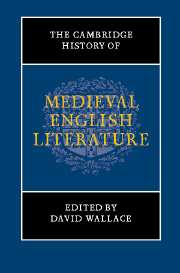Book contents
- Frontmatter
- I AFTER THE NORMAN CONQUEST
- II WRITING IN THE BRITISH ISLES
- III INSTITUTIONAL PRODUCTION
- IV AFTER THE BLACK DEATH
- Introduction
- 18 Alliterative poetry
- 19 Piers Plowman
- 20 The Middle English Mystics
- 21 Geoffrey Chaucer
- 22 John Gower
- 23 Middle English lives
- V BEFORE THE REFORMATION
- Chronological outline of historical events and texts in Britain, 1050–1550
- Bibliography
- Index of manuscripts
- Index
- References
19 - Piers Plowman
from IV - AFTER THE BLACK DEATH
Published online by Cambridge University Press: 28 March 2008
- Frontmatter
- I AFTER THE NORMAN CONQUEST
- II WRITING IN THE BRITISH ISLES
- III INSTITUTIONAL PRODUCTION
- IV AFTER THE BLACK DEATH
- Introduction
- 18 Alliterative poetry
- 19 Piers Plowman
- 20 The Middle English Mystics
- 21 Geoffrey Chaucer
- 22 John Gower
- 23 Middle English lives
- V BEFORE THE REFORMATION
- Chronological outline of historical events and texts in Britain, 1050–1550
- Bibliography
- Index of manuscripts
- Index
- References
Summary
The three versions of Piers Plowman, as most scholars today believe, were the lifelong labour of a single author named, or at least pen-named, William Langland (c. 1325–c. 1388). A unique note in Trinity College, Dublin, MS 212 supplies both the author’s name (‘willielmi de Langlond’) and his father’s (‘Stacy de Rokayle’), describing Stacy as a man of gentle birth (‘generosus’) and a tenant of the Despensers at Shipton-under-Wychwood in Oxfordshire. A note in the hand of John Bale on the paste-down of Huntington Library, San Marino, California, MS 128 asserts that Langland himself was born in Cleobury Mortimer ‘within viii myles of Malborne hylles’, and this is generally corroborated by the evidence of dialect, which links him unquestionably to south-west Worcestershire. The Malvern Hills, which figure so memorably in the poem’s setting, were also held by the Despensers, whose ‘spectacular rise and as spectacular fall in royal favor and power roughly brackets the period of the poet’s lifetime’, as Middleton has noted. Of his means of livelihood we know nothing beyond what can be gleaned from the treacherous territory of apparent autobiographical reference within the poem; in Langland’s case the usual uncertainties of authorial attribution in a manuscript culture were apparently exacerbated by the need for anonymity which the polemical nature of his writing demanded. Ambiguity, often apparently the ‘functional ambiguity’ of the political poet, characterizes Piers Plowman and everything about it. Conceived as a series of dream-visions in alliterative metre, it shares the penchant for social and ecclesiastical satire of other ‘Alliterative Revival’ poetry, but it is infinitely more complex than any poem in that tradition because it delivers its pungent commentary in a bewildering array of voices, both realistic and allegorical.
- Type
- Chapter
- Information
- The Cambridge History of Medieval English Literature , pp. 513 - 538Publisher: Cambridge University PressPrint publication year: 1999
References
- 5
- Cited by



